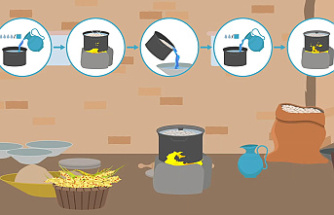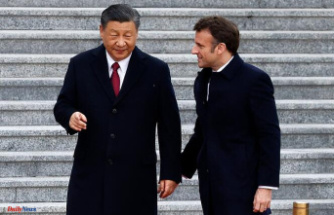The best way to protect yourself "is to reduce the risk of being exposed" to the disease, explained WHO Director General Dr. Tedros Adhanom Ghebreyesus during a press briefing in Geneva.
“For men who have sex with men, this also means, for the moment, reducing the number of your sexual partners and exchanging information with any new partner to be able to contact them” in the event of the appearance of symptoms, so that they can isolate themselves, explained Dr. Tedros, who triggered his organization's highest level of alert on Saturday in an attempt to contain the disease.
More than 18,000 cases of monkeypox have been detected worldwide since early May outside endemic areas in Africa. The disease has been reported in 78 countries so far and 70% of cases are concentrated in Europe and 25% in the Americas, said the head of the WHO.
Five people have died from the disease - all in Africa - and around 10% of cases require hospital admission to try to ease the pain patients are experiencing.
- Message from the communities -
"This message of reducing the number of partners comes from the communities themselves," explained Andy Seale, who at WHO is responsible for getting the message across to the population that is now almost exclusively affected: that of men. rather young people who have sex with men, and in particular those who multiply the number of partners.
Andy Seale recognizes that this type of recommendation cannot be effective over a long period and also that it must be accompanied by precise information on the symptoms, tests and easy access to a doctor in case of doubt to isolate themselves as soon as possible.
Monkeypox is not currently considered a sexually transmitted disease and anyone can contract it. Direct skin-to-skin contact but also infected sheets or clothing are vectors of transmission of the disease.
The WHO also strongly emphasizes the need to avoid any stigmatization of a specific community, which could lead its members to hide the disease, not seek treatment and continue to spread it.
- No vaccine for all -
For now, the WHO stresses that there are not vaccines for everyone and therefore recommends prioritizing those who are most at risk, those who are sick and those who treat or make them. of research.
“It is important to emphasize that vaccination does not protect instantly against infection or disease and this can take several weeks,” Dr. Tedros warned. Once vaccinated, it is therefore necessary to continue to take precautions.
Vaccination is carried out with two doses, spaced at least 28 days apart. For people vaccinated against smallpox in childhood, one dose is enough. For the immunocompromised a third dose is recommended.
As for the availability of doses of the vaccine from the Danish laboratory Bavarian Nordic, it is not immediate, according to the head of the WHO.
Most of the 16 million doses are in bulk and it will take "several months" for them to be available in ready-to-use vials.
Two other vaccines LC16 and ACAM2000 are also under study.
The organization stresses that it would be good to avoid the mistakes made in the management of the Covid-19 pandemic, when rich countries have monopolized almost all the vaccines available for many months, and to share the available doses fairly. .












